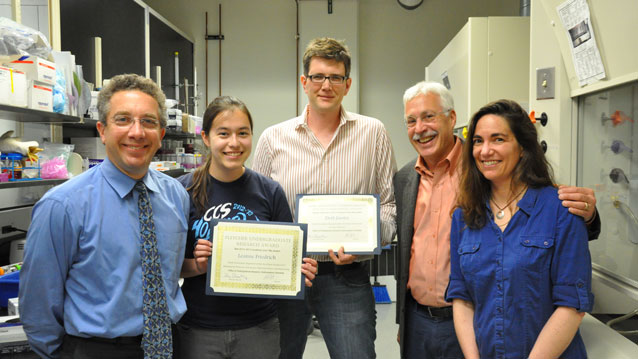EVANSTON, Ill. --- The day before she left campus for the summer, Leanne Friedrich, a materials science junior at Northwestern University, learned she was the recipient of the second annual Fletcher Undergraduate Research Grant Award for the academic year.
Peter Civetta, director of the Office of Undergraduate Research, delivered the news to Friedrich in a surprise visit last week to Derk Joester’s lab at the McCormick School of Engineering and Applied Science. Joester also was honored for his mentoring of Friedrich with the Karl Rosengren Undergraduate Research Mentoring Award.
The Northwestern Undergraduate Research Grants (URG) program funds independent student research and creative projects. Friedrich’s work was deemed the best out of this year’s 66 projects.
Since last fall, Friedrich has been studying the chiton, a mollusk found in coastal tidal zones, under the guidance of graduate student Lyle Gordon. The chiton, which lives both in and out of water, has hundreds of tiny eyes all over its shell. Unlike the eyes in most organisms, the chiton ocelli have a lens made from an inorganic material, aragonite, a form of calcium carbonate. Friedrich explored how these microlenses in the ocelli work.
“If we had more undergraduates like Leanne, we would not need graduate students,” said Joester, an associate professor of materials science and engineering. “She ran a great number of experiments, collaborated with physicists at the University of Arizona and recorded publication-quality data. Her independence and drive blew me out of the water.”
In her research, Friedrich asked: What is the microscopic structure and crystallographic texture of the lens? How is the microstructure related to optical properties such as double refraction that could cause the chiton to see double? She found that the chiton has some impressive tricks up its sleeve.
For example, the lens is put together from a small number of crystalline “grains” that are much larger than the grains in the shell adjacent to the eye. Furthermore, many of these large grains are twins, meaning that they are oriented in such a way that they are mirror images of each other.
Using sophisticated software developed by Russel Chipman and coworkers at the University of Arizona, Friedrich has learned that grain size and twinning improve the optical performance of the lenses. She also discovered that the orientation of the lens in the shell may be integral to chiton vision in air and under water. Better understanding of the chiton ocelli helps understand why and how the organism manipulates the microstructure of the lens, provides interesting clues as to how animal eyes evolve, and could help in the design of microlens arrays used, for example, in mobile device cameras, digital projectors or photovoltaic devices.
“I’m very honored to receive this award and look forward to doing more work with these lenses,” Friedrich said. “I owe many thanks to the Office of Undergraduate Research and the Chemistry of Life Processes Institute for supporting the project and to the many people who helped me along the way, especially Russel Chipman for his collaboration, University of Arizona graduate student Tiffany Lam, my graduate student mentor Lyle Gordon and my advisor Derk Joester.”
This year, the mentoring award, given to the faculty mentor of the undergraduate student winner, was named in honor of Karl S. Rosengren, professor of psychology at the Weinberg College of Arts and Sciences.
Rosengren has served as chair of the Undergraduate Research Grants (URG) review committee for a number of years, and the URG program has increased significantly under his leadership. He is leaving Northwestern this summer for the University of Wisconsin-Madison.
“Karl’s dedicated support and encouragement of undergraduate research has made a lasting impact on our University,” Civetta said. “As he prepares to move on, the Office of Undergraduate Research could think of no better way to honor his impact and legacy than through naming the faculty portion of this award for him.”
Each honor comes with a $250 cash award, funded by the Fletcher Family Foundation. A Fletcher Undergraduate Research Grant Award also is presented each year to the best research project conducted during the summer.


